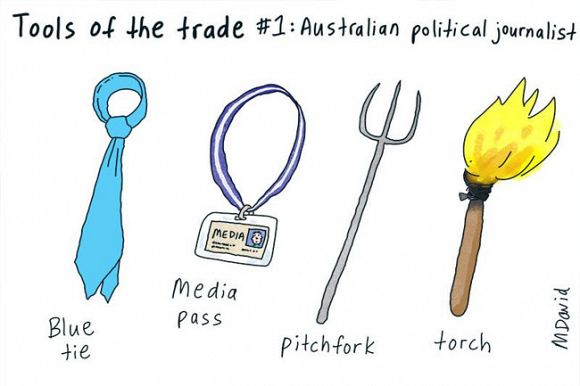With journalistic bias still a major problem in our country, it's time for the press to take accountability and become more critical, writes Paul Begley.
THE PROMINENT French political journalist, Olivier Bost, recently reviewed his analysis and prediction of the French Election, which he got spectacularly wrong. Unlike his colleagues around the globe, Bost’s review included an apology to his readers.
Mindful of the 2016 U.S. Donald Trump victory, the British Brexit vote, the 2019 Scott Morrison win in Australia as well as his 2022 loss, mainstream journalists could do worse than follow Bost’s suit. Those events were all mainstream media fails.
Unreliable polls were part of the problem but so was journalist readiness to believe the hyped-up group-think that lives a life of its own inside the bubbles in which hype has currency and gives the appearance of received wisdom.
At least two factors are in play causing this media malaise.
The first is a failure of journalists and editors to exercise scepticism, a professional quality that for many decades has been regarded as the core attribute of a hard-nosed scribe. For four long years, the U.S. media reported the utterances of Donald Trump verbatim, with 30,573 of them false utterances according to the Washington Post, but they were faithfully reported as though they were worthy of inclusion on the public record.
There is a supposition behind this practice that fits a curious notion of newsworthiness. When a man holding the position of President of the United States openly suggests that wind farms cause cancer, that his small inauguration crowd was bigger than Barack Obama's, that ingesting bleach could fend off COVID and that it wasn't really his voice on the Access Hollywood tape, those unhinged utterances astound mainstream readers, listeners and viewers.
The propositions are considered newsworthy not because any of them make sense but simply because they are absurd claims made by the person occupying the highest office in the land. Editors have not resisted the temptation to publish Trump’s false messages because they sell papers and earn digital clicks. In the short term they bring in advertising dollars, but in the longer term, the practice promotes the liar and delegitimises the messenger.
Much the same happened in Australia during Scott Morrison's administration. He could deny barefaced that he ever called Senator Sam Dastyari “Shanghai Sam” or that he was ever party to the proposition that electric cars will fail to tow your boat or pull your trailer. And he seemed confident that enough people would believe him despite video evidence to the contrary.
On a less petty level, he could tell the Australian people that he had to secretly scrap a $90 billion French contract and negotiate a $200+ billion AUKUS arrangement with the U.S. and Britain because it was in Australia's national interest to have eight nuclear-propelled submarines.
That explanation could only make sense if newspaper journalists and editors were prepared to forget that France is a world leader in the production of nuclear-powered submarines and that Australia had spent $4 billion to get France to redesign a conventional propulsion model for Australia rather than use its off-the-shelf nuclear-powered model.
Editors could only overlook that critical detail if they were prepared to report the Prime Minister in the manner of a stenographer, having abandoned any pretence of reporting the story with an overlay of critical objectivity or scepticism. The result was that Australian consumers of mainstream media were largely presented with Morrison's AUKUS proposition in a spirit of breathless enthusiasm. It was true not because it made sense but because Morrison said it.
In the telling, AUKUS became an audacious masterstroke that would win Morrison the Election and media representatives reporting it favourably could regard themselves as insiders who were rewarded with the ultimate aphrodisiac of access to the powerful.
Any journalist who would take the extra step of suggesting the Labor Party was unpatriotically offside could earn bonus credits, hence the ABC’s Fran Kelly put to Senator Penny Wong, without any supporting evidence other than Morrison saying it, the proposition that Wong had leaked a confidential national security briefing on the matter to journalists. Horrified, the Senator made it clear that she hadn't leaked anything and that Morrison was circulating the idea because he wanted to deflect from his failure to brief Labor on AUKUS in advance, an undertaking stipulated by U.S. President Joe Biden. Kelly's question assisted Morrison's deflection.
When the sport being played was the Election and being on the winning side was to gain an entitlement to celebrate with the winner and keep getting privileged access, the temptation to over-egg was hard to resist. Thus, Prime Minister Anthony Albanese not recalling the latest unemployment number was a “gaffe” that was given saturation media coverage for a fortnight and confirmed the certainty of the prediction that Labor was destined to be the election loser.
The reporting on social media and independent digital media outlets expressed exasperation at the “gaffe” reporting and astonishment that the media suppressed reporting anything that reflected poorly on Morrison, such as his apparent loss of bearings when he answered a journalist's question by calling her “Mr Speaker” more than once. The ABC reported the press conference but edited out the “Mr Speaker” gaffe. The public needed to know all about the loser Albanese's blunders, but not those of Morrison the winner.
The second part of the journalist malaise relates to hubris. Politicians enjoying the aphrodisiac of being in power too easily fall into the delusion that the power they exercise can be exploited to ensure it remains ongoing. If media representatives come to believe they share in the seductive drug that attaches to power, they invest emotion in the source of that belief. The sitting government becomes their host. As insiders, preferred journalists see themselves as special messengers, not prone to error or being faulted. With that goes a haughtiness that looks very much like the hubris exhibited by their host.
A walloping such as that dealt to the Morrison Government by the voters at the 2022 Election must have felt like a traumatic shock. Journalists know the voters are their readers, listeners and viewers, and had assumed the same voters would naturally be seeing, as plain as day, the same winner they had been writing and talking about. Yet their readers cast their ballots and voted for the loser. There must be something amiss with them.
Olivier Bost is a rare case of a journalist who has come to realise that the problem lies not with the obstinacy of the voters, but with him and his like-minded colleagues failing to read the room. In Australia, the prevailing response to date has involved no admission of error, no apology and a strident insistence that voters got it wrong.
The problem was not that the defeated government was out of touch with voter sentiment; the problem was that voters were misguided and the answer is now to double down on policy positions by more emphatically arguing for more extreme positions, such as opposing the “wokeness” of net zero on climate, of the transition away from fossil fuels, of gender equity initiatives, of integrity in government.
After nine years in which it was never seriously raised, let us now talk about the wonderful merits of nuclear power, a prohibitively expensive policy option that would be 20 years in the making and would deliver a waste disposal problem without a solution. Ready acceptance of that light-bulb notion is reported in much of the current mainstream media as the solution that Albanese is neglecting, a neglect that will lead to his demise when the voting public comes to its senses in 2025. When that time comes, the nuclear power option, having done its job, can be silently retired.
Paul Begley has worked for many years in public affairs roles, until recently as General Manager of Government and Media Relations with the Australian HR Institute. You can follow Paul on Twitter @yelgeb.
Related Articles
- Biased reporters should lose status as 'journalists'
- Who is PRGuy? PRGuy is all of us
- ABC's 'Murdochracy' creep no accident
- Albanese’s miracle win mangles media’s Dutton narrative
- EDITORIAL: Albanese’s miracle win mangles media’s Dutton narrative
 This work is licensed under a Creative Commons Attribution-NonCommercial-NoDerivs 3.0 Australia License
This work is licensed under a Creative Commons Attribution-NonCommercial-NoDerivs 3.0 Australia License
Support independent journalism Subscribe to IA.















